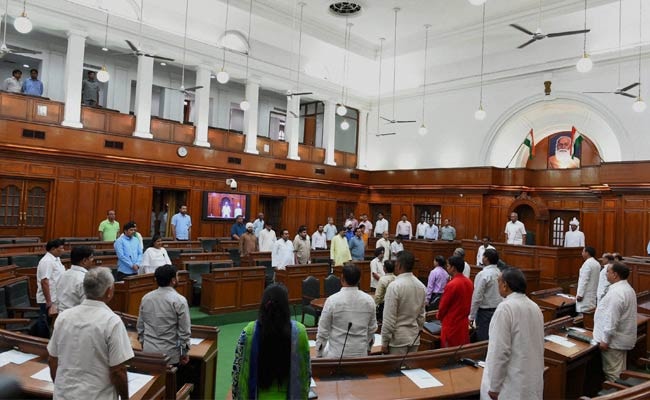
In the run-up to the assembly polls in February, the Jan Lokpal was one of the main planks of the anti-graft party.
New Delhi:
The anti-graft Jan Lokpal bill, which the AAP government has promised to table prior to every assembly session so far, may not see the light of the day even during the winter session beginning on November 18.
Unlike in its earlier 49-day tenure in 2013-14, the Aam Aadmi Party (AAP) government wants to exercise "due diligence" in bringing the legislation -- a tardy process.
"We have decided to do everything as per required procedure unlike last year when the Lokpal legislation was sought to be pushed through in the assembly regardless of the prior approval of the central government," a Delhi government official told IANS, not wishing to be identified because of the sensitivity of the issue.
High-level sources in the government said that the anti-graft legislation was yet to be accorded clearance by the Delhi cabinet prior to being referred to Lieutenant-Governor Najeeb Jung, who, in turn, will forward it to the union home ministry which will then consult the law ministry on it -- the stipulated process.
An Aam Aadmi Party insider, privy to the decision-making process in the Arvind Kejriwal-led party, baldly said there were more important tasks that needed attention.
"Providing food and shelter to the common man in the national capital is far more important," said the AAP insider who did not want to be named.
Considering the Arvind Kejriwal-led Delhi government's thorny equation with the Centre, all this is unlikely to happen before the session that is not even a fortnight away.
On February 14, 2014, Mr Kejriwal had resigned as chief minister of Delhi after the Congress and the BJP had opposed the introduction of the anti-graft bill over it not being approved by the Centre. However, exactly a year after that, the AAP came back to power with 67 seats in the 70-member assembly.
If enacted, the bill will set up an ombudsman who will probe corruption charges against public functionaries, including the chief minister.
In the run-up to the assembly polls in February, the Jan Lokpal was one of the main planks of the anti-graft party.
Mr Kejriwal had told a newspaper then that he will table the bill in the first session of the assembly, but it is yet to make an appearance.
The government had said it would table the bill in the Monsoon session. On September 28, Mr Kejriwal took to Twitter, saying that the bill was almost ready and the government should be able to present it in the winter session.
Unlike in its earlier 49-day tenure in 2013-14, the Aam Aadmi Party (AAP) government wants to exercise "due diligence" in bringing the legislation -- a tardy process.
"We have decided to do everything as per required procedure unlike last year when the Lokpal legislation was sought to be pushed through in the assembly regardless of the prior approval of the central government," a Delhi government official told IANS, not wishing to be identified because of the sensitivity of the issue.
High-level sources in the government said that the anti-graft legislation was yet to be accorded clearance by the Delhi cabinet prior to being referred to Lieutenant-Governor Najeeb Jung, who, in turn, will forward it to the union home ministry which will then consult the law ministry on it -- the stipulated process.
An Aam Aadmi Party insider, privy to the decision-making process in the Arvind Kejriwal-led party, baldly said there were more important tasks that needed attention.
"Providing food and shelter to the common man in the national capital is far more important," said the AAP insider who did not want to be named.
Considering the Arvind Kejriwal-led Delhi government's thorny equation with the Centre, all this is unlikely to happen before the session that is not even a fortnight away.
On February 14, 2014, Mr Kejriwal had resigned as chief minister of Delhi after the Congress and the BJP had opposed the introduction of the anti-graft bill over it not being approved by the Centre. However, exactly a year after that, the AAP came back to power with 67 seats in the 70-member assembly.
If enacted, the bill will set up an ombudsman who will probe corruption charges against public functionaries, including the chief minister.
In the run-up to the assembly polls in February, the Jan Lokpal was one of the main planks of the anti-graft party.
Mr Kejriwal had told a newspaper then that he will table the bill in the first session of the assembly, but it is yet to make an appearance.
The government had said it would table the bill in the Monsoon session. On September 28, Mr Kejriwal took to Twitter, saying that the bill was almost ready and the government should be able to present it in the winter session.
Track Latest News Live on NDTV.com and get news updates from India and around the world

